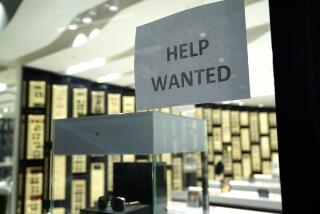Lucky breaks in the bustle of daily life
- Share via
Suddenly the traffic slows or the airline announces a delay or you open a door and find yourself at the wrong end of a two-hour line.
Time slows down. Boredom sets in. Anger bubbles to the surface.
This isn’t supposed to happen in a nation of drive-through funeral parlors, instant messaging, FedEx and fast food, but of course it does, all the time. At doctors’ offices, supermarkets, theaters and the department of motor vehicles, at the beginning of the race and the end of the outdoor concert, we stand in line, we fidget, we sigh, we feel our lives slipping away from us, moment by moment.
In short, we wait.
“We’re incredibly impatient when it comes to waiting for things to happen,” says Katherine Giuffre, an associate professor of sociology at Colorado College. But, she says, it wasn’t always like that.
Once upon a time, in a world predating the car and the assembly line, we had stillness and idleness, but not waiting as a discrete activity, separate from our preparations for nightfall, or the fall harvest or the birth of a child.
“Waiting was, in traditional societies, a time of preparation and so it wasn’t a negative condition,” Giuffre says. “Waiting had a meaning and purpose and was valued for itself.”
Today, we still do plenty of that old-fashioned waiting: We daydream and study, gossip and preen as we wait for first kisses, first dances and first cars. We absorb thousands of lessons, official and unofficial, joyful and agonizing as we move into the moment when we become teenagers, graduates, parents or citizens.
Waiting of this kind heightens our pleasures or even supercedes them, as in the Carly Simon song “Anticipation”: “We can never know about the days to come/ But we think about them anyway,/ And I wonder if I’m really with you now/ Or just chasin’ after some finer day.”
But the waiting that defines our age and inflames our culture is closer to what Tom Petty is referring to when he sings “The waiting is the hardest part.... Don’t let it kill you baby, don’t let it get to you.”
In the age of road rage, cash cards and automated check-in, waiting often feels less like a lesson or a dream and more like a personal affront.
In Las Vegas, a man recently sued his doctor for $5,000, saying he had to wait three hours for an appointment.
Whether waiting has increased or our tolerance for it has decreased is difficult to determine, but to watch an evening of TV commercials (fast food, fast cars, fast photos) or to pause in your car at a big-city intersection (touching off a chain reaction of car horns) is to know that Americans hate to wait.
You can trace our impatience to the Protestant work ethic: few countries are as obsessed with productivity as the land of the Pilgrims’ pride, and waiting bears an uncomfortable resemblance to waste and idleness.
You can blame the Industrial Revolution, which ushered in the modern “time is money” mind-set that makes us feel like we’re being robbed when we stand in line.
You can blame the fast pace of modern society. If we don’t have enough time for our families, our jobs and our friends, we’re not going to take kindly to sitting in traffic for an hour and a half.
“The anger we display about waiting has deeper issues involved,” Giuffre says. “That anger I think really is about the fact that we no longer have time to live lives that are full and rich. We live lives that are frantic and impatient.”
And we live lives that are status-conscious. To be let into the nightclub ahead of the pack is a status symbol, points out Carl Smith, a professor of American studies at Northwestern University. “To wait is to be exposed as, I won’t say a nobody, but someone without clout, a non-VIP,” Smith says.
“Waiting,” says Michael Flaherty, author of “A Watched Pot: How We Experience Time,” “is about power, and it’s about one person’s ability to get other people to do something they don’t want to do.... The doctor doesn’t wait for you. You wait for the doctor. It’s a pretty sensitive measure of relative status.” And yet, if waiting can be a burden or even a humiliation, it can also be an opportunity. Precisely because it is so different from what we want and expect, it can bring a brief reprieve from the pressures of daily life.
“It gives you an opportunity to pause -- especially Americans because they’re always hurrying in a pell-mell kind of way -- and finally here, circumstances are such that you have to stop and slow down and look around you a little bit,” Flaherty says.
“And so suddenly you see things of beauty that you might not have noticed.”
*
Nara Schoenberg is a staff reporter for the Chicago Tribune, a Tribune company.


